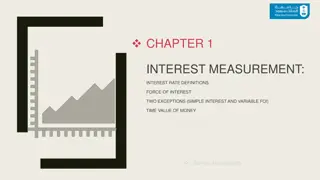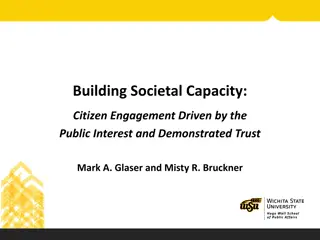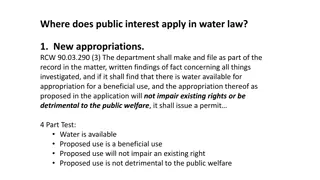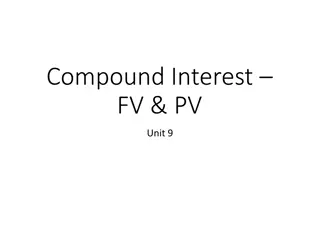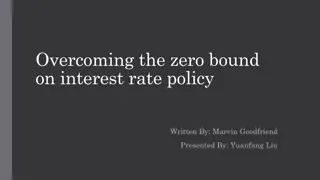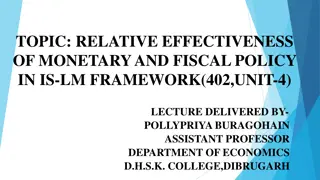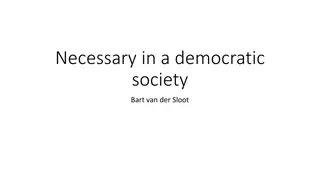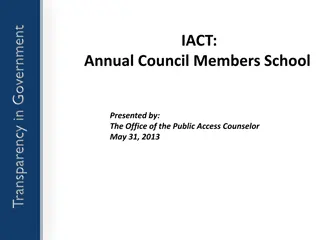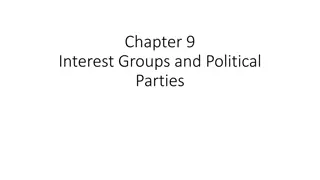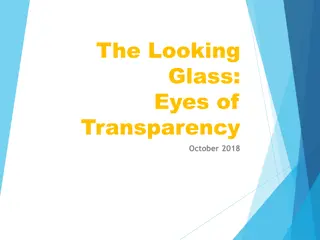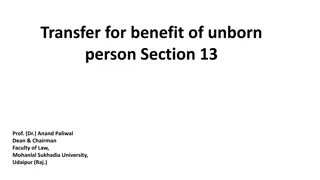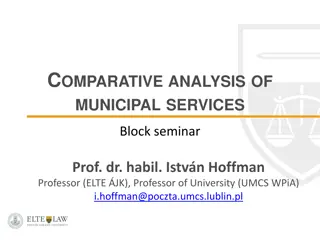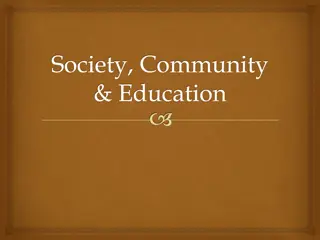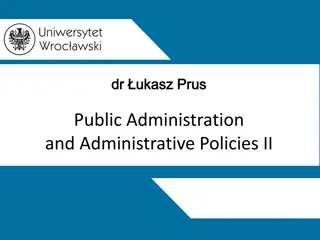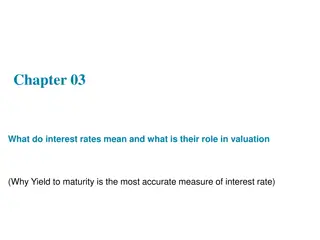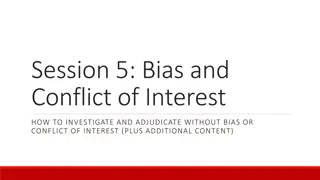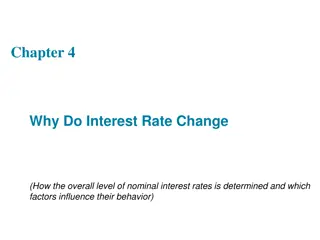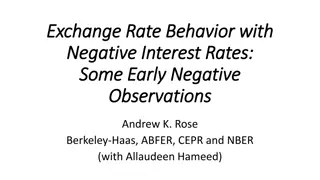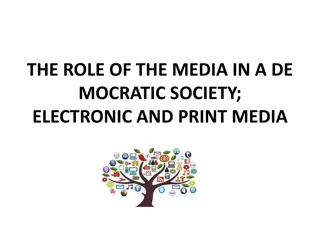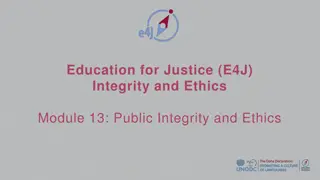Understanding the Importance of Public Interest in Society
Exploring the concept of public interest as it relates to national security, public safety, prevention of disorder and crime, and the protection of individual rights and freedoms. Highlighting key considerations such as the role of law, democratic principles, and the balance between maintaining order and respecting civil liberties.
Download Presentation

Please find below an Image/Link to download the presentation.
The content on the website is provided AS IS for your information and personal use only. It may not be sold, licensed, or shared on other websites without obtaining consent from the author. Download presentation by click this link. If you encounter any issues during the download, it is possible that the publisher has removed the file from their server.
E N D
Presentation Transcript
Overzicht van dit college (1) Algemene belangen (2) Margin of appreciation
(1) Algemene belangen Artikel 8 2 Artikel 9 2 Artikel 10 2 Artikel 11 2 Geen inmenging van enig openbaar gezag is toegestaan in de uitoefening van dit recht, dan voor zover bij de wet is voorzien en in een democratische samenleving noodzakelijk is in het belang van de nationale veiligheid, de openbare veiligheid of het economisch welzijn van het land, het voorkomen van wanordelijkheden en strafbare feiten, de bescherming van de gezondheid of de goede zeden of voor de bescherming van de rechten en vrijheden van anderen. De vrijheid zijn godsdienst te belijden of overtuiging tot uiting te brengen kan aan geen andere beperkingen worden onderworpen dan die die bij de wet zijn voorzien en in een democratische samenleving noodzakelijk zijn in het belang van de openbare veiligheid, voor de bescherming van de openbare orde, gezondheid of goede zeden of voor de bescherming van de rechten en vrijheden van anderen. Daar de uitoefening van deze vrijheden plichten en verantwoordelijkheden met zich brengt, kan zij worden onderworpen aan bepaalde formaliteiten, voorwaarden, beperkingen of sancties, die bij de wet zijn voorzien en die in een democratische samenleving noodzakelijk zijn in het belang van de nationale veiligheid, territoriale integriteit of openbare veiligheid, het voorkomen van wanordelijkheden en strafbare feiten, de bescherming van de gezondheid of de goede zeden, de bescherming van de goede naam of de rechten van anderen, om de verspreiding van vertrouwelijke mededelingen te voorkomen of om het gezag en de onpartijdigheid van de rechterlijke macht te waarborgen. De uitoefening van deze rechten mag aan geen andere beperkingen worden onderworpen dan die, die bij de wet zijn voorzien en die in een democratische samenleving noodzakelijk zijn in het belang van de nationale veiligheid, de openbare veiligheid, het voorkomen van wanordelijkheden en strafbare feiten, voor de bescherming van de gezondheid of de goede zeden of de bescherming van de rechten en vrijheden van anderen. Dit artikel verbiedt niet dat rechtmatige beperkingen worden gesteld aan de uitoefening van deze rechten door leden van de krijgsmacht, van de politie of van het ambtelijk apparaat van de Staat.
(1) Algemene belangen Nationale veiligheid Openbare veiligheid Voorkomen van wanordelijkheden Voorkomen van strafbare feiten
(1) Algemene belangen De prevention of disorder and crime wordt in veruit de meeste gevallen ingeroepen. Denk aan: Politieonderzoek: lichamelijk onderzoek, onderzoek in woning, aftappen communicatie, inbeslagname spullen, etc, in het licht van strafrechtelijk onderzoek. Gevangenen en resitrcties op hun vrijheden (communicatie, substanties, wapens, etc.) Uitzetten van criminele immigranten
(1) Algemene belangen Public safety: iets gewichtigere zaken, zoals het eventueel vrijlaten van een gevaarlijke gevangene, het uitzenden van een zelfmoordpoging en het structureel monitoren van het gedrag van personen National security: denk aan gevaar van buiten (andere staten) en van binnen (terrorismebestrijding) Vaak worden al deze gronden gewoon samen ingeroepen; het Hof hanteert gen heel strikte interpretatie
(1) Algemene belangen Economic well-being Oorsprong goudsmokkel > goudstandaard > destabilisering land Lange tijd had deze rationale ook direct verband met veiligheid, zoals smokkel van waar en verboden middelen, huiszoekingen in verband met verboden middelen, etc. Deze grond werd dan ook vaak samen ingeroepen met de prevention of disorder and crime rationele
(1) Algemene belangen Doordat de materiele reikwijdte zo is gegroeid is ook deze rationele zeer wijd geworden Migratie Gezondheids/welzijnsgerelateerde zaken Positieve verplichtingen
(1) Algemene belangen Health and morals > common law landen > prostitutie, gokken, zwervers en met name de bescherming van kinderen British Health and Morals of Apprentices Act of 1802 regulated factory conditions with regard to child workers in cotton and wool mills, inter alia limiting the working hours of children between 9 and 13 years old to a maximum of 8 hours a day and of those between 14 and 18 years old to a maximum of 12 hours, and prohibiting labour ofchildren under 9 years old. Nog steeds de meeste zaken waarin deze gronden zijn ingeroepen draaien om kinderen, bijvoorbeeld voogdijzaken of uithuisplaatsing in verband met gewelddadige ouders, seksueel misbruik, drugsgebruik door ouders of mentale stoornissen van ouders > steeds meer verwijst het Hof in dit soort zaken echter naar rights and interests of others . Public health: bijvoorbeeld als een person een gevaar is voor zichzelf en/of de samenleving, maar ook bij bijvoorbeeld BDSM Health and morals wordt meestal ingeroepen als het gaat om cultureel, religieus of maatschappelijk gevoelige thema s Homoseksualiteit, transseksualiteit, interseksualiteit, etc. Euthanasie, abortus, kunstmatige inseminatie, etc.
(1) Algemene belangen Rechten en vrijheden van anderen Oorspronkelijk zeer beperkt belang + op wetgevingsniveau Door positieve verplichtingen en (indirect) horizontale werking van het EVRM is deze grond steeds belangrijker geworden
(2) Margin of appreciation Meestal geen punt van aandacht (Bijna) Nooit schending op dit punt Zeer minimale controle: (1) Feitelijke toestand (2) Werkzaamheid middel (3) Juiste middel > Margin of appreciation
(2) Margin of appreciation Maintaining order and ensuring public safety are the raison d'etre of the state. In het geval van spionage en terreurdreiging accepteerde het EHRM een wijde margin: Nnational security is invoked, for example when democratic societies are threatened by highly sophisticated forms of espionage or by terrorism, necessitating that the State is able, in order to effectively counter such threats, to undertake the secret surveillance of subversive elements operating within its jurisdiction. In these circumstances, the Court accepts that the margin of appreciation available to the respondent State in assessing the pressing social need in the present case, and in particular in choosing the means for achieving the legitimate aim of protecting national security, was a wide one. 7 ECtHR, Leander v. Sweden, application no. 9248/81, 26 March 1987 Regulering van het leger: ECtHR, Konstantin Markin v. Russia, application no. 30078/06, 22 March 2012 Terrorismemaatregelen: ECtHR, Murray v. the United Kingdom, application no. 14310/88, 28 October 1994. Rechten en vrijheden van gevangen: ECtHR, Clift v. the United Kingdom, application no. 7205/07, 13 July 2010. ECtHR, Laduna v. Slovakia, application no. 31827/02, 13 December 2011. Immigratie: The Convention does not guarantee the right of an alien to enter or to reside in a particular country and, in pursuance of their task of maintaining public order, Contracting States have the power to expel an alien convicted of criminal offences. ECtHR, Uner v. The Netherlands, application no. 46410/99, 18 October 2006. ECtHR, Abdulaziz, Cabales and Balkandali v. the United Kingdom, application nos. 9214/80, 9473/81 and 9474/81, 28 May 1985.
(2) Margin of appreciation The State authorities are, in principle, in a better position than the international judge to give an opinion, not only on the exact content of the requirements of morals in their country, but also on the necessity of a restriction intended to meet them . ECtHR, A., B. and C. v. Ireland, application no. 25579/05, 16 December 2010, 223 & 232. See further: ECtHR, Handyside v. the United Kingdom, application no. 5493/72, 07 December 1976. Ook lokale morele gevoelens kunnen een rol spelen. As the Government correctly submitted, it follows that the moral climate in Northern Ireland in sexual matters, in particular as evidenced by the opposition to the proposed legislative change, is one of the matters which the national authorities may legitimately take into account in exercising their discretion. There is, the Court accepts, a strong body of opposition stemming from a genuine and sincere conviction shared by a large number of responsible members of the Northern Irish community that a change in the law would be seriously damaging to the moral fabric of society. This opposition reflects [] a view both of the requirements of morals in Northern Ireland and of the measures thought within the community to be necessary to preserve prevailing moral standards. ECtHR, Dudgeon v. the United Kingdom, application no. 7525/76, 22 October 1981
(2) Margin of appreciation State intervention in socio-economic matters such as housing is often necessary in securing social justice and public benefit. In this area, the margin of appreciation available to the State in implementing social and economic policies is necessarily a wide one. The domestic authorities judgment as to what is necessary to achieve the objectives of those policies should be respected unless that judgment is manifestly without reasonable foundation. Although this principle was originally set forth in the context of complaints under Article 1 of Protocol No. 1 - the Court, bearing in mind that the Convention and its Protocols must be interpreted as a whole, considers that the State enjoys an equally wide margin of appreciation as regards respect for the home in circumstances such as those prevailing in the present case, in the context of Article 8. Thus, the Court will accept the judgment of the domestic authorities as to what is necessary in a democratic society unless that judgment is manifestly without reasonable foundation, that is, unless the measure employed is manifestly disproportionate to the legitimate aim pursued. ECtHR, Blecic v. Croatia, application no. 59532/00, 29 July 2004 Not to pass judgment on the Netherlands immigration and residence policy as such. ECtHR, Berrehab v. the Netherlands, application no. 10730/84, 21 June 1988. Nachtvluchten > dat is aan het land zelf
(2) Margin of appreciation Beperktere margin bij: Meeste zaken ten aanzien van prevention of crime and disorder Rights and freedoms of other, m.u.v. belangen kind
(2) Margin of appreciation Europese consensus: the Court must have regard to the changing conditions in Contracting States and respond, for example, to any emerging consensus as to the standards to be achieved. ECtHR, Konstantin Markin v. Russia, application no. 30078/06, 22 March 2012, 126. ECtHR, Weller v. Hungary, application no. 44399/05, 31 March 2009. Internationale consensus: the Court attached less importance to the lack of evidence of a common European approach to the resolution of the legal and practical problems posed, than to the clear and uncontested evidence of a continuing international trend in favour not only of increased social acceptance of transsexuals but of legal recognition of the new sexual identity of post-operative transsexuals. ECtHR, Christine Goodwin v. the United Kingdom, application no. 28957/95, 11 July 2002
(2) Margin of appreciation Essentiele belangen van individuen Thus, when the British government discriminated against female immigrants with regard to residence permits in order to promote the economic well-being of the country, it was accepted that the number of economically active men of working age in the population exceeded the number of economically active women by nearly 30%. However, the Court pointed out that many women were engaged in part-time work and that it was in any event not convinced that the difference that may nevertheless exist between the respective impact of men and of women on the domestic labour market is sufficiently important to justify the difference of treatment ECtHR, Abdulaziz, Cabales and Balkandali v. the United Kingdom, application nos. 9214/80, 9473/81 and 9474/81, 28 May 1985, 79.
(2) Margin of appreciation Likewise, in a case in which a state discriminated against homosexuals in the army, the Court was unconvinced that this was necessary for the protection of national security and the prevention of disorder, pointing to the lack of concrete evidence to substantiate the alleged damage to morale and fighting power that any change in the policy would entail , holding that there was no actual or significant evidence of such damage as a result of the presence of homosexuals in the armed forces , and that there was no evidence of such damage in the event of the policy changing. ECtHR, Smith and Grady v. the United Kingdom, application nos. 33985/96 and 33986/96, 27 September 1999, 99.




